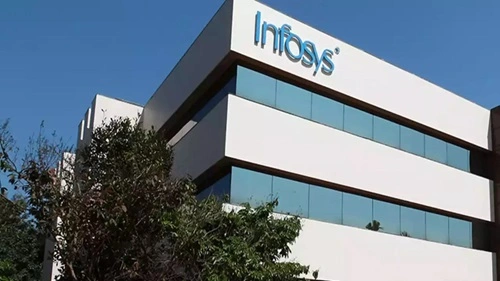Infosys, one of India’s largest and most renowned IT services companies, has been a cornerstone of the Indian software industry since its inception in 1981. The company’s journey, from a Bangalore-based startup to a global leader in technology services, mirrors the growth story of India’s IT sector. With its commitment to quality, innovation, and ethical practices, Infosys has carved a unique position for itself. However, as the global technology landscape continues to evolve at an unprecedented pace, Infosys faces new challenges and opportunities. A SWOT analysis reveals insights into Infosys’ strengths, weaknesses, opportunities, and threats within the current and future business environment.

Strengths
1. Strong Brand and Reputation: Infosys enjoys a stellar reputation in the IT services industry, both in India and internationally. The brand is associated with quality, integrity, and transparency, factors that have been instrumental in building trust among clients and stakeholders. Infosys has consistently ranked as one of India’s most valuable brands and is recognized globally for its excellence in IT services, consulting, and outsourcing. This strong brand reputation has helped Infosys attract and retain marquee clients worldwide, ensuring a steady flow of business.
2. Wide Range of Service Offerings: Infosys provides a broad array of services, including IT consulting, application development, cloud services, data analytics, artificial intelligence (AI), and digital transformation. Its comprehensive service portfolio allows Infosys to cater to diverse industries such as financial services, healthcare, manufacturing, retail, and telecom. The company’s ability to address various technological needs has enabled it to secure long-term contracts with major global corporations, making it a preferred choice for end-to-end IT solutions.
3. Robust Financial Health and Cash Reserves: Infosys is known for its prudent financial management and has consistently maintained strong financial performance, which translates into high revenue growth, steady profits, and substantial cash reserves. This financial stability allows Infosys to reinvest in research and development, pursue acquisitions, and explore strategic initiatives without compromising its financial health. It also allows Infosys to pay regular dividends, reinforcing investor confidence in the company.
4. Focus on Innovation and Research & Development: Infosys has been at the forefront of digital innovation, consistently investing in R&D to enhance its capabilities in emerging technologies like AI, machine learning, blockchain, and the Internet of Things (IoT). Through initiatives like Infosys Innovation Fund, which supports promising startups, and Infosys Labs, its research arm, the company has demonstrated its commitment to continuous innovation. This focus on innovation enables Infosys to stay ahead of technology trends and offer cutting-edge solutions to clients.
5. Global Delivery Model and Skilled Workforce: Infosys pioneered the Global Delivery Model (GDM), which leverages offshore, onshore, and nearshore resources to deliver efficient and cost-effective services. With a large workforce of skilled professionals, including engineers, data scientists, and consultants, Infosys can execute complex projects on a global scale. Its extensive training programs also ensure that its employees are equipped with the latest skills, helping Infosys maintain a high standard of service quality.
Weaknesses
1. Dependence on the U.S. Market: A significant portion of Infosys’ revenue comes from the United States, making it vulnerable to economic, regulatory, and policy changes in that region. The U.S. government’s restrictions on H-1B visas, which are crucial for Infosys’ business model, have impacted its ability to deploy skilled workers on client sites. This over-reliance on a single market exposes Infosys to geopolitical risks and economic fluctuations in the U.S., potentially affecting its revenue stability.
2. High Employee Attrition Rates: Attrition remains a challenge for Infosys, as it does for many in the IT services sector. The demand for skilled tech professionals has led to high turnover rates, as employees often seek better opportunities or higher pay. High attrition rates disrupt ongoing projects, increase recruitment and training costs, and can ultimately impact client satisfaction. Managing and retaining talent is a constant challenge, particularly in the face of intense competition from other global IT firms and tech giants.
3. Limited Product Offerings Compared to Competitors: Unlike global tech giants like IBM and Microsoft, which offer both services and proprietary software products, Infosys relies heavily on service-based revenue. This limits its revenue streams and competitive differentiation in certain segments. Although Infosys has ventured into platforms and products like EdgeVerve, the majority of its business remains services-based, which makes it vulnerable to price-based competition and limits scalability compared to competitors with proprietary technologies.
4. Slow Adoption of Strategic Acquisitions: While Infosys has made a few strategic acquisitions over the years, it has generally taken a conservative approach compared to peers like TCS and Accenture, who aggressively pursue acquisitions to drive growth in emerging areas. Infosys’s cautious approach can slow down its ability to quickly capture market share in high-growth areas. In fast-evolving sectors like AI and cybersecurity, slow acquisition activity could be a disadvantage.
Opportunities
1. Expanding Digital Transformation Demand: Organizations across sectors are increasingly investing in digital transformation to enhance efficiency, customer experience, and agility. This trend presents a massive opportunity for Infosys, whose expertise in digital services, automation, and cloud solutions makes it well-suited to help businesses modernize their operations. Expanding its digital services and helping clients leverage AI, data analytics, and the cloud can significantly boost Infosys’s growth prospects in the coming years.
2. Growing Market in Emerging Economies: Emerging markets in Asia, Africa, and Latin America are experiencing rapid digitization and technology adoption. These regions present a lucrative opportunity for Infosys to expand its client base and diversify its revenue streams. Infosys can leverage its expertise in scalable solutions and localized services to meet the needs of organizations in these emerging economies, reducing its dependency on mature markets like the U.S. and Europe.
3. Expansion into High-Growth Technologies: Technologies such as artificial intelligence, machine learning, blockchain, and the Internet of Things (IoT) are gaining traction across industries. Infosys is well-positioned to expand its capabilities in these high-growth areas, as evidenced by its investment in AI and automation platforms. By increasing its focus on AI-driven solutions and expanding its product portfolio in automation, Infosys can capitalize on the rising demand for these advanced technologies.
4. Partnerships and Strategic Alliances: Collaborating with technology leaders, cloud providers, and research institutions allows Infosys to expand its service offerings and accelerate innovation. Recent partnerships with companies like Google Cloud and Microsoft Azure have bolstered Infosys’ cloud capabilities, which are in high demand. By building more strategic alliances, Infosys can tap into new technologies, reach wider markets, and offer integrated solutions to clients.
Threats
1. Intense Competition in the IT Services Industry: The global IT services sector is highly competitive, with major players like Tata Consultancy Services (TCS), Wipro, IBM, and Accenture vying for market share. This intense competition can lead to pricing pressures, which could impact Infosys’ profit margins. Additionally, the entry of new players and the growth of in-house IT capabilities among clients could pose a threat to Infosys’ market position.
2. Economic Uncertainty and Recession Risks: Infosys, like other IT services companies, is vulnerable to economic downturns and recessions. Economic uncertainty can lead clients to reduce their IT budgets or delay large transformation projects, directly impacting Infosys’s revenue. Given the global economic volatility, including recent inflation concerns, Infosys must remain cautious and prepared for potential budget cuts from its clients.
3. Regulatory and Political Challenges: As a global company, Infosys faces regulatory risks in multiple markets. The U.S., its largest market, has tightened visa regulations, and any further restrictions could hinder Infosys’ ability to deploy skilled employees. Additionally, increasing regulatory scrutiny around data privacy, data localization, and compliance in regions like the EU can add operational complexity and potential liabilities for Infosys.
4. Rapid Technological Change: The technology landscape is evolving rapidly, and failing to keep pace with advancements can render existing service offerings obsolete. As clients increasingly demand expertise in cutting-edge technologies like AI and cybersecurity, Infosys must continuously invest in training, R&D, and product development to maintain its competitive edge. Falling behind in these areas could weaken Infosys’s market position and erode client trust.
Future Outlook
Infosys stands at a critical juncture with significant growth opportunities ahead, especially as the demand for digital transformation and emerging technologies intensifies. By expanding its digital services, enhancing its focus on emerging markets, and leveraging strategic partnerships, Infosys is well-placed to sustain its growth trajectory. However, it must address talent retention challenges, increase diversification of its client base, and keep pace with the rapid technological advancements in the industry.
As Infosys looks to the future, maintaining its reputation for quality and integrity while evolving with client needs will be essential. With a solid financial foundation, a skilled workforce, and a strategic focus on innovation, Infosys can continue to be a leader in the global IT services market while adapting to the evolving demands of a digital-first world.

